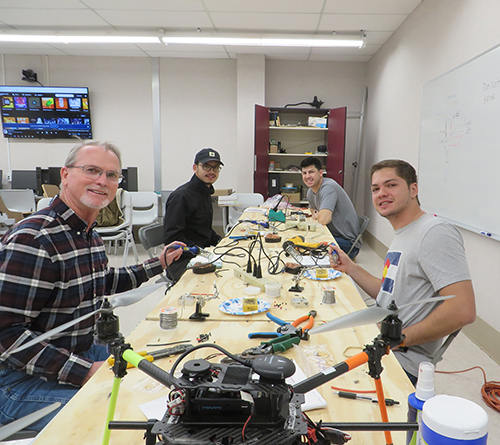Students advance with hands-on UAV technology studies at MSU
Contact: Meg Henderson

STARKVILLE, Miss.—Mississippi State students are taking advantage of a new experiential learning opportunity to gain skills on the cutting edge of technology and study unmanned aircraft vehicles, or UAVs, from the inside out.
MSU’s Unmanned Aerial Systems Precision Ag Flight program has, since 2019, offered UAV flight instruction to students, but a custom-made tabletop drone now provides further hands-on classroom learning. Throughout this semester, the drone has remained open with elements exposed so students could see how it operates and troubleshoot problems, while also having access to a repairable drone for field study.
Amelia Fox, an assistant clinical professor who joined the Department of Plant and Soil Sciences in 2015 when it was beginning to use UAVs in classes, said her job is to “break down issues in emerging technology.” When she began instruction on UAV operation there was no curriculum, so she developed one.
“I look at a problem and figure out how to teach it,” said Fox, who developed the MSU courses ag flight technologies I and II and has directed the new student projects this year. She also recently published a textbook on building drones.
Fox noted that as students learn to use the technology, accidents can happen. An error made in flying a drone can be a very expensive one, and many prefabricated UAVs cannot be repaired by the operator. Fox saw this challenge not as a barrier, but as a chance to teach new skills.
“A drone kit costs about $2,500, but for about half the cost, a tabletop version allows students to play without the risk. We can introduce problems on the tabletop model before we ever allow them to use a real drone,” Fox said.
Funding provided by two Mississippi companies in the Golden Triangle, Southern Ag Consulting and Wade Tractor & Equipment, allowed for the addition of the tabletop and flight-capable drones, which students assembled using their new soldering skills under the guidance of Fox and Bryan Whittenton, a teaching assistant who also is a qualified commercial unmanned pilot.
Nitant Rai, a forestry master’s student from Nepal, said he appreciates the practical skills gained from the experience.
“Drones are the future, and the opportunities in forest monitoring and natural resource management are limitless. I believe that learning to build a drone is equally important to learning to operate it because I can troubleshoot on my own if anything goes wrong,” Rai said.
Senior Extension Associate Louis Wasson noted the value of these courses for industrial applications.
“Autonomy in agriculture is expanding. The class teaches the fundamentals from wiring to programming. This knowledge is applicable and needed in the new age of farm machinery,” he said.
In addition to giving students the technical skills they need for careers in forestry, agriculture and more, Fox is hoping to train future teachers. She said current demand for the courses exceeds the number of class offerings.
“We need to train faculty so they can teach these skills in their disciplines,” Fox said. “We really appreciate what the funding sources have done for us. This has been an incredible opportunity for my students and me,” she added
For more on MSU’s Department of Plant and Soil Sciences, the academic home of the ag flight technology classes, visit www.pss.msstate.edu. For more on the College of Agriculture and Life Sciences, visit www.cals.msstate.edu.
MSU is Mississippi’s leading university, available online at www.msstate.edu.